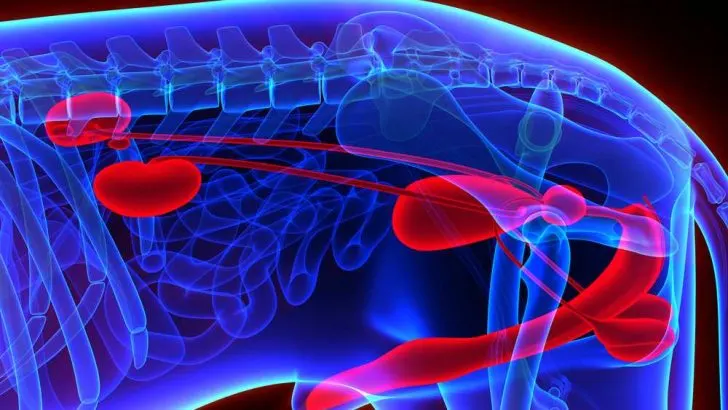Dog owners around the world would probably wholeheartedly agree that our beloved pets are like family to us and that we want what’s best for them, so it is completely normal to wonder whether they are more likely to get a certain disease or not.
When I was getting my first corgi, one of the first questions I asked was “Are Corgis Prone To Kidney Failure?”. I was relieved to find out that the answer was mostly negative and that I should not worry.
But, just like with us humans, dogs’ bodies are a complex system which can face some difficulties during the course of their lives. In order to avoid diseases in your doggies, and especially kidney disease, there are a few things you should know.
Keep reading to find out!

Are Corgis A Healthy Breed In General?
Every dog breed has some potential health issues that they might be more prone to than other breeds. That means that we, as their owners, have the responsibility to make sure it doesn’t come to it if possible.
In order to do that, we need to know what the potential risks are, what might cause them, when could we expect them and what we can do to prevent them.
Corgis are somewhere in between: they are neither a super healthy breed, nor are they one of those riddled with a bunch of diseases. But like any other breed, there are diseases that you need to look out for.
Out of the more serious diseases, corgis are most prone to hip dysplasia, intervertebral disc disease, degenerative myelopathy and epilepsy. As you can see, kidney failure isn’t on the list.
However, that doesn’t mean that you’re out of the woods just yet. Dogs of any breed can get kidney failure, but luckily it can be prevented.

Kidney Function In Dogs
Just like with us humans, kidneys play a huge role in your dog’s overall health. Their main function is to remove waste and toxins from the bloodstream, regulate the levels of some of the most important minerals like potassium and sodium, hold water and produce urine.
As such, they need to be functioning well all throughout your doggy’s life in order for them to be happy and healthy. Unfortunately, some dogs are genetically predisposed to kidney problems, but for most, the right diet and regular checkups will do the trick in preventing it.
When talking about kidney function in dogs, it is important to note that some foods can lead to kidney disease or even failure. In addition to foods, there are other factors that could also contribute to a compromised kidney function.

Grapes And Raisins: The Biggest No-No
There are foods that we all know are not that great for our doggies: very salty meals with lots of spices, sweets and chocolate, coffee and tea, and so on. These foods are likely to harm your doggie, no matter their breed. However, you probably know some owners that do not follow these rules.
On the other hand, there are a few foods that must be avoided at all costs. Among those foods are grapes and raisins.
As beneficial as they can be to people, they are one of the few types of food that are highly toxic to dogs and can very likely lead to kidney failure and even death.
Such a definite answer probably raises lots of questions in your mind: what makes them toxic to dogs, what is the fatal dose, how fast should you react, what should you do, and so on. Here are some answers!
What Makes Them Toxic for Corgis?
Even though they are some of the most notorious among the forbidden foods for dogs, it is still somewhat unknown what exactly makes grapes and raisins so toxic to dogs.
Some research that has previously been done has pointed to mycotoxin and salicylate. Newer research, on the other hand, has been suspicious of tartaric acid as the main reason for the toxicity.
Even though a number of different studies have been done on this subject, there hasn’t been one single factor identified as the definite main reason for the toxicity.
How Much Is Too Much?
Since we have established the incredibly harmful effects raisins and grapes have on dogs, it is only natural to wonder if there is such a thing as the fatal dose.
Unfortunately, there isn’t a precise answer here either. The truth is, it varies from dog to dog. Logically speaking, a larger dose is more likely to cause a faster and more detrimental effect, as opposed to a smaller dose, but there really are no rules here.
The only safe thing you can do is to avoid them all together.
How Quickly Should You React?
Because raisins are so dangerous to dogs, a quick reaction from you as their owner can be the deciding factor when it comes to your dog surviving. If you notice that your dog has eaten a grape or raisin, you should immediately take your dog to their vet, or an emergency veterinary clinic.
What Should You Do?
Contrary to what some might say, if your dog has eaten grapes or raisins, you should not induce vomiting in your dog yourself, unless you have been told to do so by the vet.
What you must do is take your dog to their vet or an emergency vet clinic where they can be treated.
The treatment in these cases mainly consists of decontamination. The vet will most likely induce vomiting in your dog to get the ingested food out of their stomach. Also, they will probably give your dog some active charcoal in order to bind any remaining grapes or raisins and absorb the toxins.
Aside from that, do not be surprised if your dog is hospitalized overnight or even several days for monitoring and so that they can be given all the necessary supplements through an IV.

Other Causes Of Kidney Failure In Corgis
Even though food is the most common factor contributing to kidney failure, there are other factors that might cause it in your dog.
Bacterial Infections
Bacterial infections are a common health issue millions of people deal with on a regular basis. However, it can also be present in dogs and can lead to kidney injury. This doesn’t have to happen, but shouldn’t be overlooked as a potential risk. Furthermore, humans can also contract it from their dogs via urine, so a quick recognition is key.
Toxins
There are many household items that can be toxic to dogs. Some of them include the aforementioned grapes and raisins, over the counter medication like aspirin as well as prescribed meds and antifreeze.
Genetics
Just like humans, dogs inherit both good and bad genes from their ancestors. Unfortunately, some of those genes might carry the potential for kidney disease. Some puppies fail to develop their kidneys normally, and some develop large ones with lots of cysts.
If this is the case, they will most likely show signs of such problems even as young pupps.

Is Kidney Failure Common In Corgis?
Dogs are a man’s best friend. So, we want to do everything right by them and protect them from any harm that might come their way.
Even though there are some things that we unfortunately cannot prevent, kidney disease usually isn’t one of them. While we can’t fight genetics, we can make sure we do not do anything that could cause kidney problems in our dogs. So here is a rundown of everything you should know!
Even though corgis are prone to certain diseases, genetics are on our side when it comes to kidney issues. That means that your corgi isn’t at any greater risk of getting it than any other dog breed out there!
However, there are foods, such as raisins and grapes that can most definitely do damage to your pup, and even cause death, so you should make sure to keep those away from your dog and also inform all your friends and family to do the same.
Aside from food, there are other factors that might result in kidney failure, some of them being hereditary, some a cause of bacterial infections and some of our own unintentional wrongdoing.
So, now that you know the most important information on kidneys and corgis, you can safely enjoy your time with your beloved pet. Just remember that sharing is caring, but some things are better selfishly kept to yourself!

